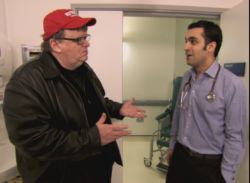Mark:
When Bowling for Columbine was released in 2002 it had a profound impact, both on the documentary form and on its maker, Michael Moore. No longer the guy on the outside in tv shows ‘The Awful Truth’ and ‘TV Nation’, he was big time, front and centre… and an Academy Award winning filmmaker. Fahrenheit 9/11 followed as the highest grossing documentary of all time.* Moore became a punching bag for right-wing commentators, and somehow bigger than the stories he told.
 In realising that his impact was being diminished by the constant attacks on the man and not the message, Moore seems to have decided to spend as little time as possible on screen in his latest diatribe on the state of American society. Targetting the health care system he obviously loathes, and specifically the HMOs, insurance companies and health care lobbyists, Moore is barely seen until late in the film. He is still obviously present – as narrator, his sing-song voice is instantly recognisable – but his absence from the vision is somewhat jarring. There is a certain charm to early Moore work: Roger & Me and his tv shows illustrate a battle between a small guy with heart and the mighty corporate evil-doers. The presence of gentle giant Moore, in all his baseball cap wearing scruffiness, allows the audience to better relate as he seems to be one of them. Moore’s absence from the screen weakens Sicko.
In realising that his impact was being diminished by the constant attacks on the man and not the message, Moore seems to have decided to spend as little time as possible on screen in his latest diatribe on the state of American society. Targetting the health care system he obviously loathes, and specifically the HMOs, insurance companies and health care lobbyists, Moore is barely seen until late in the film. He is still obviously present – as narrator, his sing-song voice is instantly recognisable – but his absence from the vision is somewhat jarring. There is a certain charm to early Moore work: Roger & Me and his tv shows illustrate a battle between a small guy with heart and the mighty corporate evil-doers. The presence of gentle giant Moore, in all his baseball cap wearing scruffiness, allows the audience to better relate as he seems to be one of them. Moore’s absence from the screen weakens Sicko.
That said, he still has some points to make, and they are made with aplomb. Moore’s thesis is skillfully constructed, gradually building the impression of a system so manipulated by the corporations and lobbyists that the audience can make only one conclusion – that the USA needs universal health care. His argument is exemplified further by visits to countries such as Canada, the UK and Cuba to chat to health care providers and patients, contrasting their seeming happiness with their health systems with the despair he has so clearly demonstrated at home.
It is in this section that Moore finally steps in front of the camera, and that the audience may feel more comfortable. There he is, the great hulking frame and bad dress sense making him accessible and friendly. He is willing to act dumb to make the point that Americans may well be shocked by conditions in other countries. Unfortunately, this part of the film is also the weakest. Moore’s trademark stunt towards the end of the film feels more like manipulation (of both the subjects and the audience), and the notion that he and a bunch of other Americans could just wander around Cuba with a film crew is plain silly.
Disregarding the manipulation of the less fortunate that, like it or not, is also a stock component of the Moore canon, Sicko is a well-made argument for health care reform in the USA. Perhaps if his opponents weren’t so caught up in left- vs right-wing politics, and could think with compassion about their fellow countrymen, there would be hope of change. Sadly, it seems Moore’s plea is likely to fall on partisan ears.
Rating: